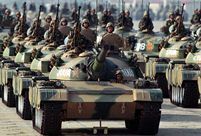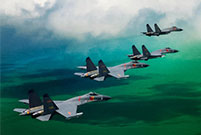

China and Russia started the Joint Sea 2015 II exercise on Thursday and it will run until Friday in the waters of the Peter the Great Gulf, off the Clerk Cape and the Sea of Japan. This is another major form of military cooperation after the two countries conducted joint naval exercises in the Mediterranean during May 11-21 that has attracted worldwide attention.
As China and Russia expect, the ongoing military drills have sparked multiple speculations from Western powers, led by the US, as past military cooperation did. Since Chinese troops joined Russia's Victory Day Parade in the Red Square in May, there have been many voices suggesting that the world is split into two blocs, the US and its allies making up one and China and Russia the other. They may last at least until China's September 3 military parade that commemorates the 70th anniversary of the victory of the War of Resistance against Japanese Aggression (1937-45) and the World Anti-Fascist War.
This seems to have become a habitual mind-set of Western strategists so that once something happens to Sino-Russian relations, they would come up with the seemingly contradictory but internally coherent belief that China and Russia are building an alliance against the US and the West, but the two are destined to diverge.
Such linear and stereotypical thinking are easily accepted by Western strategists because theoretically it is concise, strongly explanatory and useful for foreseeing the direction of Sino-Russian relations. The West's perception looks refined and convincing, but its only defect is to be opposite to reality.
An alliance is never an option for China and Russia. Russian President Vladimir Putin said China and Russia are neighbors and in this sense "natural allies," but he stressed at several occasions that they are not military and political allies. And forging partnerships but not an alliance has long been the centerpiece of China's independent foreign policy of peace.
"No alliance" is not a word game, but a rational choice by China and Russia after the bumpy history of China-Soviet relations. In fact, China and Russia both have more important bilateral relations than with the other and a military exercise will not upgrade their relationship to an alliance.
Meanwhile, the West often plays down the future of the China-Russia relationship, but what has happened since the Cold War shows that bilateral ties are immune to both U-shaped and L-shaped trajectories. On the contrary, the relationship has made new breakthroughs from time to time despite the West's prediction of their estrangement.
The military cooperation including joint exercises is an integral part of China-Russia comprehensive strategic partnership.
The two held five joint naval exercises from 2005 to 2014, although the regular coordination is always doubted by countries like the US and Japan. The West may focus on the higher frequency from annual to biannual and the larger scale of their joint drills since 2012.
But the core conception behind China-Russian relations is defensive realism and a defensive arrangement similar to buying insurance, in a bid to deal with uncertainties arising in the global power shift, international system transformation and reorganization of the Asia-Pacific order.
The two countries disapprove of exclusive military cooperation and define the exercises as to manage unconventional security. They have both participated in several bilateral and multilateral joint drills organized by other powers including the US and international organizations.
In comparison, the massive military drills that the US and its allies frequently hold may have been the original stimulant that compels China and Russia to respond to the uncertainties coming up in regional and global order. In the impact-response pattern, the actor and reactor should not be confused.
It is fair that the West sees China-Russia military drills as a sign of the two countries getting closer, but it would be narrow-minded to reckon that they therefore constitute a new strategic axis against the West and the US.
This is an illusionary perception given that the existing powers are in an increasingly unfavorable situation in terms of relative strength.
It indicates that despite the fading sense of global blocs, the Cold War mentality lingers and takes time to resolve. Be it for China and Russia that advocate partnership but not alliance or the US and its alliance system that still indulge in the sense of global blocs, there is a pressing need to prevent strategic miscalculation.
 In pics: album of PLA grand military parades
In pics: album of PLA grand military parades Chinese tanks in National Day Parade
Chinese tanks in National Day Parade In pics: shocking aftermath of Tianjin blasts
In pics: shocking aftermath of Tianjin blasts
 Indomitable Chinese people during WWII
Indomitable Chinese people during WWII
 Awesome Chinese missiles
Awesome Chinese missiles Amazing photos of Chinese Air Force in parade
Amazing photos of Chinese Air Force in parade Striking moments when strategic missiles are launched
Striking moments when strategic missiles are launched Shocking scenes found in 4000-year-old earthquake relic
Shocking scenes found in 4000-year-old earthquake relic Stunning moments of Chinese fighter jets
Stunning moments of Chinese fighter jets Beijing’s popular toy market to close down
Beijing’s popular toy market to close down Morale needed as pessimism roils market
Morale needed as pessimism roils market Capital’s population sees shrinking growth amid economic upgrading
Capital’s population sees shrinking growth amid economic upgrading Some Uyghurs travel to Turkey to connect with local culture, religion, but fail to find what they hoped
Some Uyghurs travel to Turkey to connect with local culture, religion, but fail to find what they hopedDay|Week